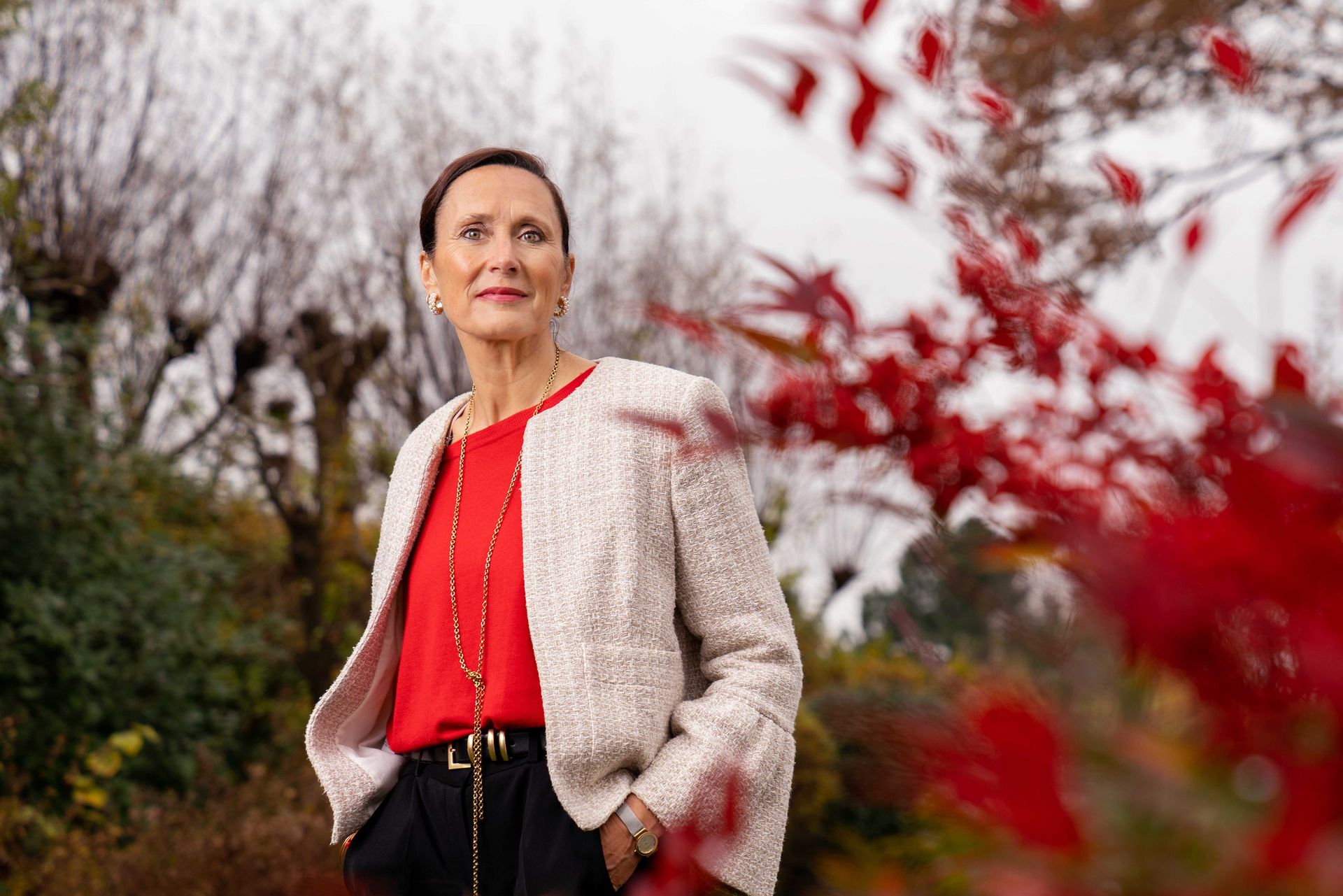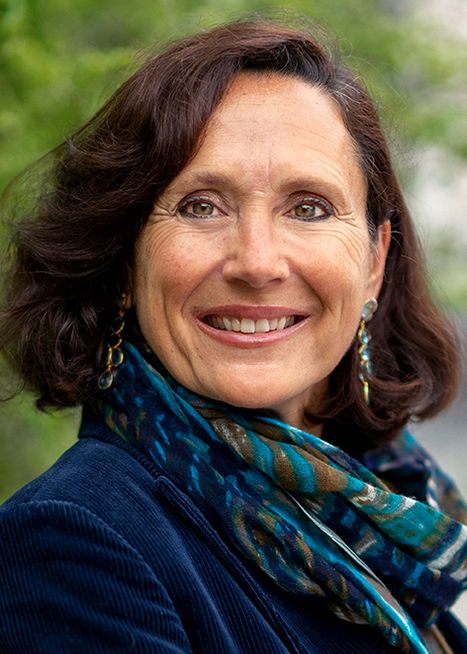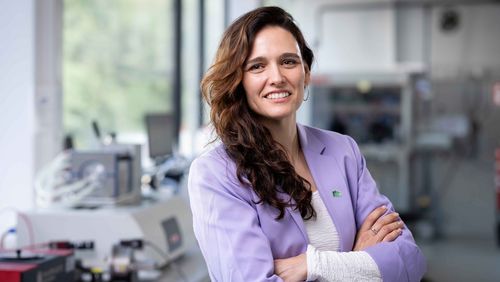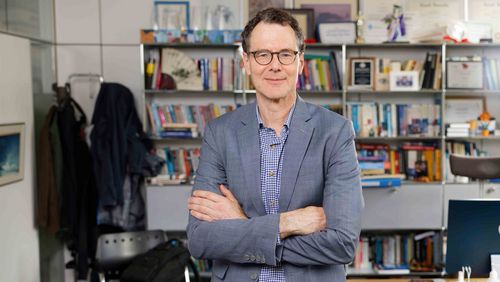
“We’re in the middle of a polycrisis”
If we don’t want to jeopardise our future, we must act now, says Sandrine Dixson-Declève, co-president of the Club of Rome. And, she adds, while science is critical for achieving a sustainable future, it will take more than new technologies to manage the multiple crises that are threatening humanity.
Sandrine Dixson-Declève, does your work as co-president of the Club of Rome cause you sleepless nights? Or make you angry—or depressed?
Like many others who work in this area, I vacillate between hope and despair. Sometimes I’m optimistic. For example, when I see we have most of the tools we need to solve these problems, and that we have decision makers who listen. Unfortunately, however, those moments are rare. And now when I see yet more drilling for crude oil and gas, or how governments are moving to the right—well, it makes me very worried. We’re in the middle of a planetary emergency, and most people have the feeling they can carry on as usual.
But you don’t seem to have succumbed to despair.
Dana Meadows, lead author of The Limits to Growth, the report published by the Club of Rome, once said, “There is too much bad news to justify complacency. There is too much good news to justify despair.” I think that’s a very important point. Every day, we have to remember that there’s good and bad news. And we must remain hopeful.
To this day, the Club of Rome is best known for The Limits to Growth, published more than fifty years ago. At the time, Meadows and her co-authors warned of catastrophic consequences unless we take action against population growth, industrialisation, environmental pollution, malnutrition and the exploitation of non-renewable resources. Have the challenges changed over time?
I think the problems have remained about the same. The world’s population has continued to grow over the past fifty years, further depleting natural resources. Last autumn, the Stockholm Resilience Centre issued a new report confirming we’ve exceeded six of nine planetary boundaries. This is exactly what The Limits to Growth predicted should we continue living in an extractive economy that advocates productivity and growth at all costs.
Some observers criticise the report, saying its forecasts were inaccurate.
Yes, some people say: “But we haven’t passed peak oil. We still have natural resources.” And that’s true. However, the report didn’t say we wouldn’t have any resources left. It showed that population growth would make access to resources more difficult. And that there are combined effects of social and environmental tensions.

Club of Rome
The Club of Rome is an association of leaders and experts from various disciplines and more than thirty countries. Founded in 1968, the non-profit organisation strives to ensure a sustainable future for humanity as a whole. Its landmark study, The Limits to Growth, was published in 1972 and warned of economic repercussions in the 21st century unless society changes how it consumes the planet’s natural resources.
What’s the most urgent problem right now?
Today we’re seeing a co-occurrence of social and environmental tipping points. If we look at the scenarios in The Limits to Growth, they demonstrated that a series of major tipping points—points of no return—could be reached in the 2020s. And now, here we are in the 2020s, in the middle of a polycrisis: a climate crisis, a health crisis, the Ukraine invasion, and also a biodiversity crisis. To mark the fiftieth anniversary of The Limits to Growth, we wrote a book—Earth for All—to address all these tension points and to propose possible and viable alternative scenarios.
What conclusions do you draw?
We show that the world’s social crisis will be the critical tipping point and that this is probably our greatest existential threat. Inequality in the richest nations—the US or UK, for example—is on the rise. And inequality between rich and poor nations has increased exponentially. This leads to social tensions and wars, it benefits authoritarian regimes, destabilises democracies and provides a fertile breeding ground for populism.
And these developments then spill over to other problems like the climate crisis?
Exactly. But it’s not really a spillover, it’s an interaction. For example, we see that higher temperatures in India have a direct impact on how men treat women. There’s more aggression, more domestic violence.
Why?
For one, tempers naturally run high in hotter weather. For another, fears are growing with global warming, with the rising temperatures—in this case, male aggression has increased due to poor harvests. Men are worried they won’t be able to feed their families. Who would have thought that more aggression would be a consequence of climate change? But this is exactly what system-dynamic modelling and systems thinking is all about. These tools can be used to gain insights into the structures and behaviours of complex systems—and to identify a series of interrelated tension points.
Are there other such combined systemic effects?
We saw the same thing during the pandemic when people were forced to stay indoors. This, too, had an impact on domestic violence, especially in families living in close quarters. Or the Ukraine invasion combined with the very hot summer in France, Italy and Spain, which led to a sharp rise in food prices as well as value-chain disruptions. We often overlook these combined effects—and tend to forget they’re direct consequences of a polycrisis and the interrelationship between complex systems.
“I vacillate between hope and despair.”
In Earth for All, you propose five pathways to change the trajectory. They concern poverty, inequality, empowerment, energy and nutrition. Do you see progress in any of these areas?
It’s critical to understand that solutions must go beyond improving any one individual area. The five pathways must work together as a whole. For example, some people believe we can solve everything through technology. Technological innovations are hyped, they’re “sexy”. But we’ll never solve problems of inequality and poverty through technology alone. We need more: we need the right governance to rewire the economic and financial systems—and to enable new technical solutions at the right pace and scale. But we humans tend to resist political and economic change.
One of your proposals is to introduce a universal basic dividend: businesses would be taxed for consuming resources that actually belong to the larger community. This includes water, land, minerals, fossil fuels, data. Do you see movement in this direction?
Norway and Alaska have systems that are very similar to our proposal. Every year, the governments there give their population a cheque or tax refund. This way, people experience first-hand how the global commons, our natural resources, are shared. That said, the population’s share isn’t very large compared to company profits.
In general, one of the Club of Rome’s key demands is reorienting the economy towards sustainability and away from growth that’s measured by a country’s gross domestic product. How do you want to achieve this?
Well, it won’t be the economy that takes action. We need governments to step in and create new indicators that weaken the significance of the GDP and productivity in these metrics. They can do this by lending more weight to other economic indicators like access to housing, healthcare, education and other social services. Another way would be by taxing externalities of energy or food. And by giving real value to the factors that are most important for people’s lives and livelihoods. Yet none of this is happening. That’s why we developed our “well-being index”. It shows that general well-being did indeed increase up to the start of this decade, mainly in high-income countries. But, especially in the past few years, we’ve registered a dramatic decline in people’s well-being—due to the pandemic, the invasion in Ukraine and the effects of inflation.
What’s behind this development?
We’ve seen a complete decoupling of the financial markets from the real economy. Most of the profit winds up in the pockets of shareholders or interest groups rather than being directed into the producing economy. We have no binding social contract. When a business lays off employees, its shares go up. That’s good for the company and the shareholders, but the layoffs create costs for the social system, society at large and individual livelihoods.
So inequality is again the problem.
Yes.

Sandrine Dixson-Declève
Sandrine Dixson-Declève is co-president of the Club of Rome, an office she shares with South African doctor and politician Mamphela Ramphele. A Belgian citizen who grew up in the US, she studied environmental sciences, economics and international relations. Sandrine Dixson-Declève has advised the UN, EU and governments across the globe as well as companies, academic institutions and NGOs on issues surrounding sustainability and new economic models as well as climate and energy policies. The media company GreenBiz ranks her as one of the world’s thirty most influential women who are driving change towards a low-carbon economy and promoting green business. To mark the 50th anniversary of the Club of Rome, she and renowned co-authors published Earth for All to show how humanity can still get a grip on the world’s most pressing problems.
Sandrine Dixson-Declève, Owen Gaffney, Jayati Ghosh, Jørgen Randers, Johan Rockström, Per Espen Stoknes: Earth for All – A Survival Guide for Humanity, New Society Publishers, 2022
In Earth for All, you write that humanity is at a crossroads. How much time do we have to get moving in the right direction?
We’re running out of time. Now is the time to act. We’ve already seen 1.2 degrees Celsius of warming and we’ll most likely reach 1.5 degrees by 2030. We’re already seeing devastating effects, even in Europe: floods, droughts, forest fires. And the impacts will be even greater once we reach between 1.5 and 2 degrees of warming. We also have grave social tipping points that are linked to the climate tipping points. That’s the main message in the book: society is at a crossroads due to the combination of social and environmental emergencies.
What role does science play in enabling or accelerating change?
Science is fundamental in these processes, and our models are based on scientific findings. But we also need to integrate scientific knowledge into the ongoing political discourse on issues like climate action. Unfortunately, we’re seeing a divergence here. The science is becoming more and more robust in terms of its predictions, but this new knowledge isn’t being channelled into negotiations. In addition, there are people in parts of governments, parts of the economy, who want to know absolutely nothing about the crisis. Because that would mean they, as leaders, would have to foster deep change. But their chief concern is retaining power and profit. This is where things are becoming increasingly tense: between people in power and people like myself, scientists or young people who say: this is no longer the time to just cling to power. We must do things differently—and not only work to protect our own individual interests but ensure that we thrive collectively.
“The social crisis is our greatest existential threat.”
How can funding organisations like the Werner Siemens Foundation contribute to a more sustainable future?
I think such bodies need to understand the role of science today. Science and research should have only one focus: enabling society to thrive within planetary boundaries. In our times of planetary crisis, we need to invest all our research funding into what really matters. And science, for its part, mustn’t stay in the confines of the ivory tower. It must focus on the most pressing challenges of the 21st century. And results must be implemented and scaled up quickly, especially because, in many cases, research and innovation are much too slow. I’m also chair of the European Commission’s Expert Group on the Economic and Societal Impacts of Research and Innovation, where we’re working on making science relevant for politicians who are responsible for taking policy decisions. We often see that policymakers don’t get research findings on time—namely when they have to take decisions.
But it’s not only politicians who have to take decisions. We all do. And we all know that climate change is a threat and that we can’t consume resources indefinitely. And still, many people—not just those in power—are doing nothing. How do you explain this disconnect between knowledge and action?
I think human beings suffer from the ostrich syndrome: we’d rather stick our heads in the sand than look at the problem, and we’re only willing to change when something hits us right in the face. However, there are also many people who are worried and anxious, some have even given up. They’ve grown cynical about their political leaders and governments. But I believe that if you give people a hopeful vision, an alternative and positive future, then they’re ready for change.
And how do you give them that vision?
We conducted a survey in all G20 countries in which seventy-four percent of the respondents declared they wanted a transformation to an economy that ensures greater well-being for all, not just a few. This is the key message in our book and the one I’m bringing to governments and other audiences. I don’t think it’s smart to stir up fears. Activists in the environmental and climate movement are often criticised for just that. I prefer to look at things as a challenge, maybe because I grew up in the US. When you run a race, you know it’s going to be tough. What motivates you is how you’ll feel when you achieve your goal, the sense of achievement at the end. The race we’re facing is a marathon, and we have to find a way to show people what reward is awaiting them at the finish line: the opportunity to lead a holistic, fulfilling life.



